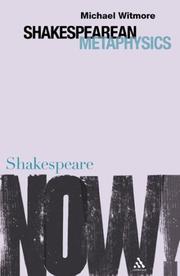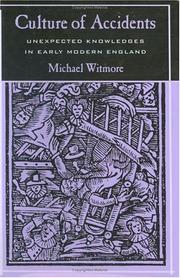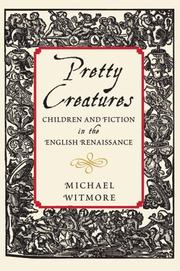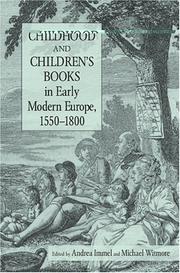| Listing 1 - 10 of 12 | << page >> |
Sort by
|

ISBN: 9780826490438 9780826490445 0826490433 0826490441 1282874772 1441149473 1472555503 9786612874772 9781441149473 9781282874770 9781472555502 6612874775 Year: 2008 Volume: *1 Publisher: London ; New York : Continuum,
Abstract | Keywords | Export | Availability | Bookmark
 Loading...
Loading...Choose an application
- Reference Manager
- EndNote
- RefWorks (Direct export to RefWorks)
Metaphysics is usually associated with that part of the philosophical tradition which asks about 'last things', questions such as: How many substances are there in the world? Which is more fundamental, quantity or quality? Are events prior to things, or do they happen to those things? While he wasn't a philosopher, Shakespeare was obviously interested in 'ultimates' of this sort. Instead of probing these issues with argument, however, he did so with plays. Shakespearean Metaphysics argues for Shakespeare's inclusion within a metaphysical tradition that opposes empiricism and Cartesian dualism.
Metaphysics in literature --- Metaphysics --- Shakespeare, William --- Shakespeare, William, --- Criticism and interpretation --- Philosophy --- Shakespeare, William, - 1564-1616 - Criticism and interpretation --- Shakespeare, William, - 1564-1616 - Philosophy --- Shakespeare, William, - 1564-1616 --- Metaphysics in literature. --- Criticism and interpretation. --- Philosophy.

ISBN: 0804779910 9780804779913 9780804735568 0804735565 Year: 2001 Publisher: Stanford, Calif. Stanford University Press
Abstract | Keywords | Export | Availability | Bookmark
 Loading...
Loading...Choose an application
- Reference Manager
- EndNote
- RefWorks (Direct export to RefWorks)
Collapsing buildings, unexpected meetings in the marketplace, monstrous births, encounters with pirates at sea—these and other unforeseen “accidents” at the turn of the seventeenth century in England acquired unprecedented significance in the early modern philosophical and cultural imagination. Drawing on intellectual history, cultural criticism, and rhetorical theory, this book chronicles the narrative transformation of “accident” from a philosophical dead end to an astonishing occasion for revelation and wonder in early modern religious life, dramatic practice, and experimental philosophy. Embracing the notion that accident was a concept with both learned and popular appeal, the book traces its evolution through Aristotelian, Scholastic, and Calvinist thought into a range of early modern texts. It suggests that for many English writers, accidental events raised fundamental questions about the nature of order in the world and the way that order should be apprehended. Alongside texts by such canonical figures as Shakespeare and Bacon, this study draws on several lesser-known authors of sensational news accounts about accidents that occurred around the turn of the seventeenth century. The result is a cultural anatomy of accidents as philosophical problem, theatrical conceit, spiritual landmark, and even a prototype for Baconian “experiment,” one that provides a fresh interpretation of the early modern engagement with contingency in intellectual and cultural terms.
Accidents --- Philosophy, English. --- English philosophy --- Philosophy, British --- Common accidents --- Injuries --- Diseases --- First aid in illness and injury --- Violent deaths --- Disasters --- Emergencies --- History. --- Causes and theories of causation

ISBN: 0801463556 9780801463556 9780801443992 0801443997 Year: 2018 Publisher: Ithaca, NY
Abstract | Keywords | Export | Availability | Bookmark
 Loading...
Loading...Choose an application
- Reference Manager
- EndNote
- RefWorks (Direct export to RefWorks)
Children had surprisingly central roles in many of the public performances of the English Renaissance, whether in entertainments-civic pageants, children's theaters, Shakespearean drama-or in more grim religious and legal settings, as when children were "possessed by demons" or testified as witnesses in witchcraft trials. Taken together, such spectacles made repeated connections between child performers as children and the mimetic powers of fiction in general. In Pretty Creatures, Michael Witmore examines the ways in which children, with their proverbial capacity for spontaneous imitation and their imaginative absorption, came to exemplify the virtues and powers of fiction during this era.As much concerned with Renaissance poetics as with children's roles in public spectacles of the period, Pretty Creatures attempts to bring the antics of children-and the rich commentary these antics provoked-into the mainstream of Renaissance studies, performance studies, and studies of reformation culture in England. As such, it represents an alternative history of the concept of mimesis in the period, one that is built from the ground up through reflections on the actual performances of what was arguably nature's greatest mimic: the child.
Children --- Theater and children --- Children in literature. --- English literature --- Childhood in literature --- Children in poetry --- Children and theater --- Childhood --- Kids (Children) --- Pedology (Child study) --- Youngsters --- Age groups --- Families --- Life cycle, Human --- History --- History and criticism.
Digital
ISBN: 9780801463556 Year: 2018 Publisher: Ithaca, N.Y. Cornell University Press
Abstract | Keywords | Export | Availability | Bookmark
 Loading...
Loading...Choose an application
- Reference Manager
- EndNote
- RefWorks (Direct export to RefWorks)
Multi
ISBN: 9781107026612 9781139208147 9781108733663 1108733662 9781316247372 1316247376 1139208144 9781316249277 1316249271 110702661X 9781316251164 1316251160 1316234142 131623603X 131625495X 1316253058 1316245489 1322561044 Year: 2015 Publisher: Cambridge Cambridge University Press
Abstract | Keywords | Export | Availability | Bookmark
 Loading...
Loading...Choose an application
- Reference Manager
- EndNote
- RefWorks (Direct export to RefWorks)
Written by an international team of literary scholars and historians, this collaborative volume illuminates the diversity of early modern religious beliefs and practices in Shakespeare's England, and considers how religious culture is imaginatively reanimated in Shakespeare's plays. Fourteen new essays explore the creative ways Shakespeare engaged with the multifaceted dimensions of Protestantism, Catholicism, non-Christian religions including Judaism and Islam, and secular perspectives, considering plays such as Hamlet, Julius Caesar, King John, King Lear, Macbeth, Measure for Measure, A Midsummer Night's Dream and The Winter's Tale. The collection is of great interest to readers of Shakespeare studies, early modern literature, religious studies, and early modern history.
Shakespeare, William --- Religion and drama. --- Drama --- Religious tolerance in literature. --- Cultural pluralism in literature. --- Religion in literature. --- Literary criticism --- Religious aspects. --- European --- English, Irish, Scottish, Welsh. --- Shakespeare, William, --- Religion. --- England --- Religion --- Pluralism (Social sciences) in literature --- Drama, Modern --- Dramas --- Dramatic works --- Plays --- Playscripts --- Stage --- Literature --- Dialogue --- Drama and religion --- Philosophy --- Shakespear, William, --- Shakspeare, William, --- Šekʻspiri, Uiliam, --- Saixpēr, Gouilliam, --- Shakspere, William, --- Shikisbīr, Wilyam, --- Szekspir, Wiliam, --- Šekspyras, --- Shekspir, Vilʹi︠a︡m, --- Šekspir, Viljem, --- Tsikinya-chaka, --- Sha-shih-pi-ya, --- Shashibiya, --- Sheḳspir, Ṿilyam, --- Shaḳspir, Ṿilyam, --- Syeiksŭpʻio, --- Shekspir, V. --- Szekspir, William, --- Shakespeare, Guglielmo, --- Shake-speare, William, --- Sha-ō, --- Şekspir, --- Shekspir, Uiliam, --- Shekspir, U. --- Šekspir, Vilijam, --- Ṣēkspiyar, Viliyam, --- Shakspir, --- Shekspyr, Vyli︠e︡m, --- Şekspir, Velyam, --- Ṣēkspiyar, Villiyam, --- Shēkʻspʻiyr, Vlilliam, --- Ṣēkspiyar, --- Ṣēkspiyar Mahākavi, --- Ṣēkspiyar Mahākaviya, --- Sheḳspier, Ṿilyam, --- Shēkʻspir, --- Shakespeare, --- Śeksper, --- Шекспир, Вильям, --- Шекспир, Уильям, --- שייקספיר, וויליאם, --- שייקספיר, וו., --- שיקספיר, וויליאם --- שיקספיר, ויליאם --- שיקספיר, ויליאם, --- שכספיר, ויליאם, --- שכספיר, וילים, --- שכספיר, ו׳ --- שעפקספיר, וויליאם, --- שעקספיער, וויליאם --- שעקספיער, וויליאם, --- שעקספיער, ווילליאם --- שעקספיער, וו., --- שעקספיר --- שעקספיר, וו --- שעקספיר, וויליאם, --- שעקספיר, וויליאמ --- שעקספיר, ווילליאם --- שעקספיר, ווילליאם, --- שעקספיר, וו., --- שעקספיר, װיליאם, --- שעקספיר, װילליאם, --- שעקספיר, װ., --- שעקספער --- שעקספער, וויליאמ --- שקספיר --- שקספיר, וו --- שקספיר, וויליאם --- שקספיר, וויליאם, --- שקספיר, ווילים, --- שקספיר, וילאם --- שקספיר, ויליאם --- שקספיר, ויליאם, --- שקספיר, ויליים, --- שקספיר, וילים --- שקספיר, וילים, --- شاكسبير، وليم --- شاكسپير، وليم --- شكسبير، وليام --- شكسبير، وليم --- شكسبير، وليم، --- شكسبير، و. --- شكسپير، وليم --- شكسپير، ويليام --- شيكسبير، وليام --- شيكسبير، وليام.، --- شيكسبير، وليم --- شکسبير، وليم --- وليم شکسبير --- 沙士北亞威廉姆, --- 沙士比亞威廉姆, --- 莎士比亞威廉姆, --- 莎士比亞威廉, --- 莎士比亞, --- Religious aspects --- Angleterre --- Anglii︠a︡ --- Inghilterra --- Engeland --- Inglaterra --- Anglija --- England and Wales

ISBN: 0415972582 9780415972581 9780203958582 9781135473327 9781135473396 9781135473464 9780415803632 Year: 2006 Publisher: New York, N.Y. Routledge
Abstract | Keywords | Export | Availability | Bookmark
 Loading...
Loading...Choose an application
- Reference Manager
- EndNote
- RefWorks (Direct export to RefWorks)
Children's literature. Juvenile literature --- Sociology of literature --- imago --- kinderen --- literatuurgeschiedenis --- jeugdliteratuur --- anno 1500-1799 --- Children in literature --- Children's literature, European --- Children --- 82:37 --- 82-93 --- 82-93 Kinderliteratuur. Jeugdliteratuur --- Kinderliteratuur. Jeugdliteratuur --- 82:37 Literatuur en opvoeding. Literatuur en onderwijs --- Literatuur en opvoeding. Literatuur en onderwijs --- Childhood --- Kids (Children) --- Pedology (Child study) --- Youngsters --- Age groups --- Families --- Life cycle, Human --- Childhood in literature --- Children in poetry --- European children's literature --- European literature --- History and criticism --- Books and reading&delete& --- History --- Books and reading
Book
ISBN: 9780393339482 Year: 2010 Publisher: New York, N.Y. W.W. Norton & Company
Abstract | Keywords | Export | Availability | Bookmark
 Loading...
Loading...Choose an application
- Reference Manager
- EndNote
- RefWorks (Direct export to RefWorks)
Book

ISBN: 9782916120591 Year: 2016 Publisher: Paris Ithaque
Abstract | Keywords | Export | Availability | Bookmark
 Loading...
Loading...Choose an application
- Reference Manager
- EndNote
- RefWorks (Direct export to RefWorks)
Information systems --- Literature --- Discourse analysis, Literary --- History and criticism --- Theory, etc --- Data processing --- Theory, etc. --- Data processing.
Book

ISBN: 9783110661996 Year: 2019 Publisher: Kalamazoo, MI
Abstract | Keywords | Export | Availability | Bookmark
 Loading...
Loading...Choose an application
- Reference Manager
- EndNote
- RefWorks (Direct export to RefWorks)
Digital

ISBN: 9783110661996 9783110660449 9781580443654 Year: 2019 Publisher: Kalamazoo, Mich. Medieval Institute Publications
Abstract | Keywords | Export | Availability | Bookmark
 Loading...
Loading...Choose an application
- Reference Manager
- EndNote
- RefWorks (Direct export to RefWorks)
| Listing 1 - 10 of 12 | << page >> |
Sort by
|

 Search
Search Feedback
Feedback About UniCat
About UniCat  Help
Help News
News